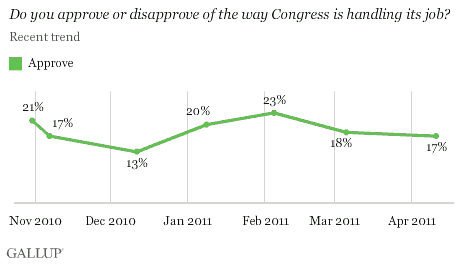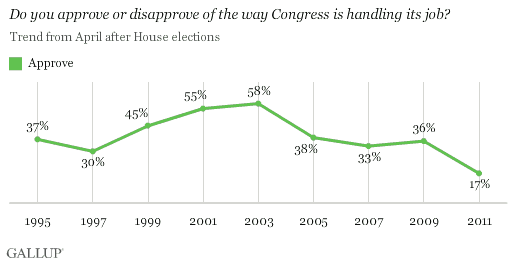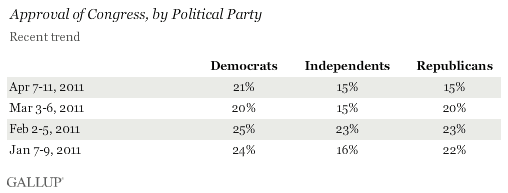PRINCETON, NJ -- Congress' approval is at 17%, essentially unchanged from last month's 18%, and identical to where it was just after last November's midterm congressional elections. The current rating is just four percentage points above the all-time low of 13% from December.

Congress' approval rose slightly in January and February as the new 112th Congress took office, before dropping back in March. This is a typical pattern, which was also evident after a new party took control of the House in 1995 and 2007. In both of those years, congressional approval rose in the initial months of the new Congress, and then settled back down, as it has this year.
Americans perceive the current Congress much more negatively than they have perceived any other Congress in the April after a House election since 1995 (Gallup did not have complete April trends in years before that). The next-lowest rating was 30% in April 1997.

Americans' views of Congress have generally been low in recent years, averaging 20% this year and 19% last year, compared with the historical average of 34%. The highest congressional approval rating since Gallup began measuring approval systematically in 1974 was 84% in October 2001, shortly after the Sept. 11 terrorist attacks. Congressional approval has been below the 50% level since July 2003.
Democrats Slightly More Positive
Republicans now control the House, while Democrats control the Senate. This division of party control may be one explanation for the lack of differentiation in congressional approval across party lines. Both Republicans and independents give Congress a 15% approval rating, while Democrats give Congress a slightly higher 21% rating.
Republicans' views of Congress, while down from January, February, and March, are still higher than they were in all of 2010. Prior to that, they were at 15% in December 2009, near the end of Barack Obama's first year as president. Just before the Republicans lost control of the House in the November 2006 elections, rank-and-file Republicans gave Congress a 50% job approval rating.

Implications
Congress' approval rating in Gallup's April 7-11 survey is just four points above its all-time low. The probability of a significant improvement in congressional approval in the months ahead is not high. Congress is now engaged in a highly contentious battle over the federal budget, with a controversial vote on the federal debt ceiling forthcoming in the next several months. The Republican-controlled House often appears to be battling with itself, as conservative newly elected House members hold out for substantial cuts in government spending. Additionally, Americans' economic confidence is as low as it has been since last summer, and satisfaction with the way things are going in the U.S. is at 19%.
Survey Methods
Results for this Gallup poll are based on telephone interviews conducted April 7-11, 2011, with a random sample of 1,077 adults, aged 18 and older, living in the continental U.S., selected using random-digit-dial sampling.
For results based on the total sample of national adults, one can say with 95% confidence that the maximum margin of sampling error is ±4 percentage points.
Interviews are conducted with respondents on landline telephones and cellular phones, with interviews conducted in Spanish for respondents who are primarily Spanish-speaking. Each sample includes a minimum quota of 400 cell phone respondents and 600 landline respondents per 1,000 national adults, with additional minimum quotas among landline respondents for gender within region. Landline telephone numbers are chosen at random among listed telephone numbers. Cell phones numbers are selected using random digit dial methods. Landline respondents are chosen at random within each household on the basis of which member had the most recent birthday.
Samples are weighted by gender, age, race, Hispanic ethnicity, education, region, adults in the household, and phone status (cell phone-only/landline only/both, cell phone mostly, and having an unlisted landline number). Demographic weighting targets are based on the March 2010 Current Population Survey figures for the aged 18 and older non-institutionalized population living in U.S. telephone households. All reported margins of sampling error include the computed design effects for weighting and sample design.
In addition to sampling error, question wording and practical difficulties in conducting surveys can introduce error or bias into the findings of public opinion polls.
View methodology, full question results, and trend data.
For more details on Gallup's polling methodology, visit www.gallup.com.
